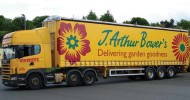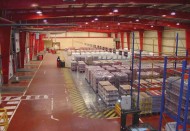 William Sinclair Horticulture Ltd, a leading UK producer of commercial horticulture and branded garden products, has awarded CHEP a three-year contract worth approximately £800,000 a year.
William Sinclair Horticulture Ltd, a leading UK producer of commercial horticulture and branded garden products, has awarded CHEP a three-year contract worth approximately £800,000 a year.
From its distribution depots in Lincoln and Carlisle, William Sinclair uses CHEP pallets to deliver to over 3,000 customers including national accounts such as The Garden Centre Group, Wilkinson, Focus and B&Q, as well as an extensive range of independent garden centres.
Jonathan Ford, Purchasing Manager at William Sinclair confirmed that CHEP had been re-appointed as their proposal had included opportunities to maximise efficiencies relating to product handling and deliveries. He said: “Our delivery trends are very seasonal. We manufacture throughout the year building stock, but dispatch is compressed into a five month period from February to June. CHEP offers us an incisive logistics solution, which helps us meet our customer commitments.”
Daniel Walsh, Commercial Director, CHEP UK & Ireland said: “One of the key factors that enabled CHEP to secure the contract was our comprehensive UK service centre network and our knowledge of Sinclair’s supply chain and the wider market requirements. This detailed know-how enabled us to present a compelling and innovative proposal designed to both reduce William Sinclair’s supply chain costs and maintain deliveries during their peak selling period.”
Moving to the automotive sector, Jaguar Land Rover and CHEP have agreed on a contract extension to take care of the premium carmaker’s packaging needs in its Halewood, Solihull and Castle Bromwich plants.
Jaguar Land Rover identified a number of specific benefits that CHEP offers, including removing the need to use capital to purchase and maintain the containers. Using CHEP containers, which are continually recycled across the supply chain, also delivers significant environmental benefits when compared with one-way packaging. Extending the contract ties-in with the carmaker’s strategy to limit the environmental impact of its operations.
Meanwhile in the frozen foods business, Birds Eye has reduced its average trip costs by 10% during the past year through outsourcing its equipment management to CHEP. Servicing the Birds Eye business involves the CHEP Equipment Management (CEM) team organising over 550,000 CHEP pallet movements per year.
Using the CEM service enables Birds Eye to outsource the management of its equipment to a dedicated control team. This delivers significant efficiencies and cost savings as Birds Eye can focus on its core business, whilst CEM takes care of all the equipment, including the capture of the supply chain activity flows. CEM uses a bespoke software system which constantly analyses Birds Eye’s supply chain and spots any anomalies so that immediate action can be taken. This also helps Birds Eye to deal with sudden and dramatic increases in demand, such as when the UK pea harvest reaches its peak. This period, between June and August every year, can see up to 12,000 pallets issued each week.
On mainland Europe, two leading bottling firms – Danone Eaux France and Casbega – are working with CHEP to both increase efficiencies and reduce the carbon footprint associated with their respective distribution networks.
More than 1,650 truck journeys will no longer be necessary – equivalent to a saving of more than 1,000 tonnes of CO2 per year – following CHEP’s transportation agreement with Danone Eaux France, the world’s second largest producer of bottled water.
The business uses up to five trains a week to deliver its Evian and Volvic products from plants in France to the Daventry rail terminal in the UK.
On the return journey the trains will now be filled with some 460,000 CHEP empty pallets annually which would previously have been transported by truck. A further 240,000 CHEP pallets are being returned under a similar arrangement from the Danone’s Hockenheim and Duisbourg logistics centres to France using the return rail capacity following Danone deliveries to Germany.
In Spain, Casbega, one of the country’s largest Coca-Cola bottling companies, has a similar focus on reducing its impact on the environment. Industrial and logistical director, José María Sánchez, said: “To achieve these results consistently we need reliable and committed suppliers like CHEP. The CHEP pallet is far superior to white wood pallet alternatives and allows us to optimise the efficiency of our production operations. Using sub-standard pallets only leads to problems in our highly-automated production facility.”
Finally, Alfa-Beta Vassilopoulos, a leading food retailer in Greece, has experienced a 16% year-on-year increase in the number of CHEP pallets it handles.
 AB Vassilopoulos is currently handling more than 200,000 CHEP pallets each year, as suppliers switch to CHEP’s higher quality pooled pallets to ship goods to its distribution centres and stores across Greece.
AB Vassilopoulos is currently handling more than 200,000 CHEP pallets each year, as suppliers switch to CHEP’s higher quality pooled pallets to ship goods to its distribution centres and stores across Greece.
Warehouse Manager Alexandros Anagnostopoulos said: “Using a pallet pooling service creates supply chain efficiencies and allows our suppliers to concentrate on manufacturing their products, rather than having to be concerned with pallet availability. The high quality of CHEP pallets helps protect products in transit, compared with white wood pallets, which are generally in poor condition from being used numerous times in different industries without being inspected or repaired.”
Further information about CHEP is available at: www.chep.com




Comments are closed.